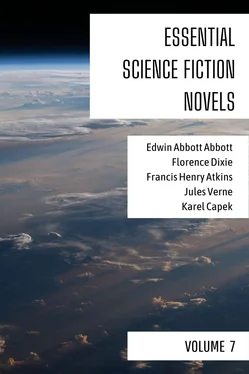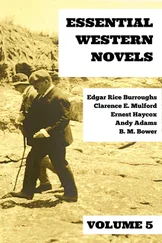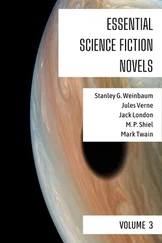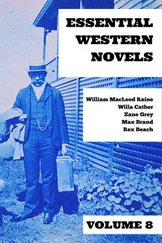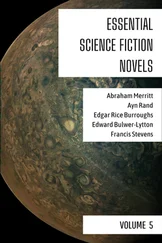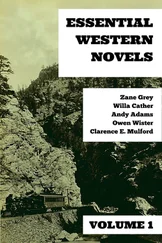He pretends to be offended at her remark does Jack Delamere, and pulls his horse a little away from her own. She notices the movement, and laughs lightly, as she urges her animal alongside him, and taps him gently on the shoulder with her whip.
“Look there, Jack!” she exclaims at the same time; “we are not the first on the course after all. Look at those two riding over the fence alongside the brook. Who are they, I wonder? The woman can ride, it is easy enough to see that.”
They are just turning to the left through the gate leading to the Steeplechase Course on the Burton Flats, and as Jack Delamere’s eyes follow the direction indicated by Flora Desmond, he at once perceives two mounted figures, galloping up the course in the direction of the grand stand. One is a man, the other a woman.
As Flora Desmond has declared, the woman can ride. She sits her horse straight as a dart. He is pulling a bit, but she has him well in hand, and he is not likely to get away with her.
“Hector D’Estrange, by all that’s holy! and with a woman, too,” laughs Jack Delamere. “Look, Florrie! Is the world coming to an end, or am I dreaming?”
“That you are certainly not,” she answers quickly; “there is no mistake about it. But who is she?”
They have joined the others now, and find them equally exercised over the female apparition.
It may be explained that this is the morning of the Melton Hunt Steeplechases, and that this party has ridden over early to the course to go round the fences, and inspect them severally. They had bargained on being the first in the field, but now perceive that they have been forestalled by Hector D’Estrange and his companion.
“Let’s go and have a look,” suggests Lord Westray. He is an admirer of women, and it is easy to perceive, even at the distance which separates the party from the stranger, that she is a fine one.
They all gallop down to the stand, riding along in a row towards Hector and his friend. He sees them coming, and says something to her, and Flora notices that she brings her horse closer to his side. Mrs. Trevor and Lady Manderton are all eyes and stare as they pass the two. Hector has raised his hat politely, and wished them a good-morning. His face is flushed with the exercise of riding, his rich auburn hair shines out like gold in the sunlight, his glorious eyes, dark in their sapphire-blue, look particularly winning and beautiful. But it is with his companion that the eyes of the others are busy. They are all struck by her extreme loveliness, and are loud in wonder as to who she is. Only Lord Westray is silent; white as a sheet, too. It is years since he set eyes on Lady Altai, and now he sees again, after a long lapse of time, the woman whom he so grievously wronged more than twenty-two years before—his divorced wife, Speranza de Lara.
“Come on,” he exclaims, just a shade roughly to Lady Manderton. He has of late been, by the way, making up to her. She has got tired of Sir Arthur Muster–Day, and has shelved him for the “wicked earl,” by which name Lord Westray is known in Society circles. Mrs. Trevor, too, though she still sticks to Kil, and makes him believe that she is as devoted to him as ever, has managed to hook on to herself several other devoted swains, to all of whom in turn she expresses a mint of devotion, while really feeling not the slightest affection for any of them. She has played her part well, however, for they each severally believe themselves to be “the favoured man” in her good graces.
They gallop forward in the wake of Lord Westray, and Flora Desmond and Jack Delamere are once more alone.
“What a lovely woman!” she bursts out, as soon as they have passed Hector D’Estrange and Speranza. “Jack, did you ever see such eyes? I never saw lovelier, unless perhaps Hector D’Estrange’s. What a handsome pair the two make!”
“Well, yes, Florrie, she is certainly a lovely woman. Cunning dog, young Hector, to have kept her out of sight so long. Now we can understand why he is so cold to women. Of course that’s where his heart is, without doubt,” answers Jack Delamere, with a smile.
“The Melton Hunt Steeplechases of 1894 are over. The meeting will long be remembered by the unparalleled success of Mr. Hector D’Estrange, who, riding in the six races printed on the card for competition, came in first, the winner of every one of them. This success is all the more remarkable, inasmuch as four of the winners were non-favourites, so that the wins must be ascribed to the splendid horsemanship of their jockey. The feat is unparalleled, the nearest approach to it being when Captain ‘Doggie’ Smith in 1880 carried off all the races on the card except one, being defeated in a match which closed the day’s proceedings between Lord Hastings’ Memory, and Lord James Douglas’ The General. In this match ‘Doggie’ Smith rode Lord Hastings’ mare, and Lord James Douglas his own horse, The General.”
Such is the announcement chronicled in a well-known weekly sporting paper a few days after the Melton Hunt Steeplechases of 1804, scoring yet another triumph on the path of thoroughness for Hector D’Estrange.
“So you will not?”
“A thousand times, no!”
They are standing facing each other are the speakers—one a beautiful, tall, graceful woman, with masses of rich gold hair coiled upon her noble head, and eyes whose light is like the turquoise gem, the other a middle-sized, handsome, good-looking man, whose dark eyes gleam with fury and disappointed passion.
We have seen them both before, this man and woman, seen them on more than one occasion; for it is not difficult to recognise in that evil-featured man the person of Lord Westray, or in that beautiful woman that of Speranza de Lara.
He has come here for no good purpose has the “wicked earl.” Ever since, on the Burton Flats, he had fallen across the lovely woman whose life he had made a desert, Lord Westray had been a prey to a consuming passion to regain that which he had lost. Twice in her life Speranza had defied him, and on each occasion he had had his revenge. The first was when, as a girl of seventeen, she had refused him, and he, through the instrumentality of his cruel mother, who had played on her love for her brothers, had forced her to become his wife. The second was when, in defiance of man’s laws, she had fled from his vile brutality and hateful presence, with the first and last love of her young life, poor Harry Kintore; and he, following up those two to the sunny land where they had sought a refuge, and where they asked for no other boon but to be allowed to live with and for each other, had shot down in her very presence the man to save whom she would have given a thousand lives of her own.
And now he is here, oblivious of all his past brutality, to insult her with yet another proposal, one more hideous than any he has ever made before. Consumed with passion for this woman, who had defied him, he has actually come to propose that she shall forget the past and remarry him!
Forget the past! Is it likely? Will the memory of her suffering childhood ever pass away? Will the recollection of her wedding day fade from her mind? Will the six years of torture as his wedded wife disappear like a dream? Above all, can she ever forget her first meeting with Harry Kintore, the heart’s awakening that came with it, or the terrible moment when, struck down at her feet, his dear eyes looked their love for the last time? Impossible.
He grinds his teeth with rage does Lord Westray as her clear, sad voice distinctly gives him his answer. He is racking his brain for a means of overcoming her, and forcing her once more to obey his will. The fact that she defies him, hates him, loathes him, has refused him, only arouses in him more madly than ever the desire to become possessed of her once again. Lord Westray possesses, in a heightened degree, in an aggravated form, the characteristic peculiar to all men, of desiring that which is either hard to get, or which denies itself to them, and which, if once obtained, fades in value in their eyes. It is Speranza’s resistance to his wishes that fires him with the fury of a wild animal to regain her.
Читать дальше
